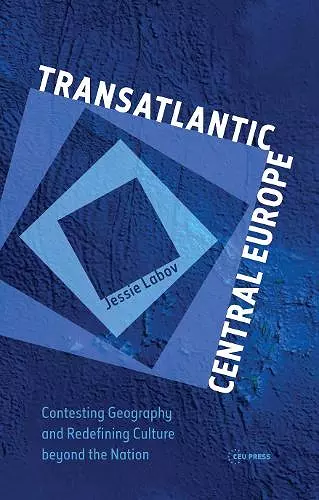Transatlantic Central Europe
Contesting Geography and Redifining Culture beyond the Nation
Format:Hardback
Publisher:Central European University Press
Published:10th Apr '19
Should be back in stock very soon

While there are still occasional uses of it today, the term Central Europe carries little of the charge that it did in the 1980s and early 1990s, and as a political and intellectual project it has receded from the horizon. Proponents of a distinct cultural profile of these countries—all involved now in the process of Transatlantic integration—used Central European, as a contestation with the geo-political label of Eastern Europe. This book discusses the transnational set of practices connecting journals with other media in the mid-1980s, disseminating the idea of Central Europe simultaneously in East and West. A range of new methodologies, including GIS-mapping visualization, is used, repositing the political-cultural journal as one central node of a much larger cultural system. What has happened to the liberal humanist philosophy that Central Europe once evoked? In the early years of the transition era, the liberal humanist perspective shared by Havel, Konrád, Kundera, and Michnik was quickly replaced by an economic liberalism that evolved into neoliberal policies and practices. The author follows the trajectories of the concept into the present day, reading its material and intellectual traces in the postcommunist landscape. She explores how the current use of transnational, web-based media follows the logic and practice of an earlier, 'dissident' generation of writers.
"Labovs Studie leistet einen wichtigen Beitrag, indem sie die bisweilen eher kleinteilig und nationalhistorisch ausgerichtete Erforschung des ostmitteleuropäischen Exils während des Kalten Krieges in größere zeitliche und räumliche Kontexte einbettet sowie für Fragen der Mediengeschichte und der postcolonial studies anschlussfähig macht. Mit ihrer These, dass das Identitätskonzept eines zum Westen gehörenden „Mitteleuropas“ das Produkt transatlantischer Kommunikationsnetzwerke sei, macht Labov das Potenzial deutlich, das die Exilforschung gerade für die Historisierung kulturräumlicher Imaginationen birgt. Denn während die Rezeption postkolonialer Theorien in der Osteuropaforschung der 1990er-Jahre dazu führte, sich kritisch mit „westlichen“ Perspektiven auf die Region auseinanderzusetzen, bietet die Erforschung des Exils die Möglichkeit, nach den Handlungsspielräumen nichtwestlicher Akteure im Angesicht internationaler Machtasymmetrien zu fragen." -- Kai Johann Willms * H-Soz-Kult *
"Transatlantic Central Europe is a thought-provoking volume that employs theoretical and methodological innovations to a seemingly passé idea, and thereby not only improves on the intellectual historical record, but also demonstrates its enduring relevance for cultural politics in the present. The book is clearly written, and is thus accessible even to those with no prior exposure to the literary figures discussed." * Slavic Review *
"Labov leistet mit ihrer akribischen Studie einen wichtigen Beitrag zur Exil- und Ostmitteleuropaforschung und beleuchtet diesen Themenkomplex mit Methoden der digitalen Geisteswissenschaft. Das Buch zeichnet sich durch seine gute Lesbarkeit aus und überrascht mit einem innovativen Blick auf einen Themenbereich, der zwar vielseitig erforscht, aber von einer digital und GIS-basierten Analyse noch nicht erfasst wurde. Labov hat gewiss eine Brücke zwischen der Vergangenheit und der Gegenwart geschlagen und auf diese Weise zur Heilung von ostmitteleuropäischen Minderwertigkeitskomplexen beigetragen." * Shepunkte *
"Labov’s book offers a welcome combination of traditional and innovative methodologies, and brings together analysis of both well-known and unjustly neglected publications, primarily periodicals. While in Slavic literary history the prominent role of periodicals has long been recognized, recent years have also seen the rise of periodical studies as a specialized subfield of literary scholarship in the US and elsewhere, which is an additional factor that should garner Labov’s study wider attention beyond Slavic and East European Studies." -- Vitaly Chernetsky * Polish Review *
- Commended for Kulczycki Book Prize in Polish Studies 2020
ISBN: 9786155053290
Dimensions: unknown
Weight: 500g
246 pages